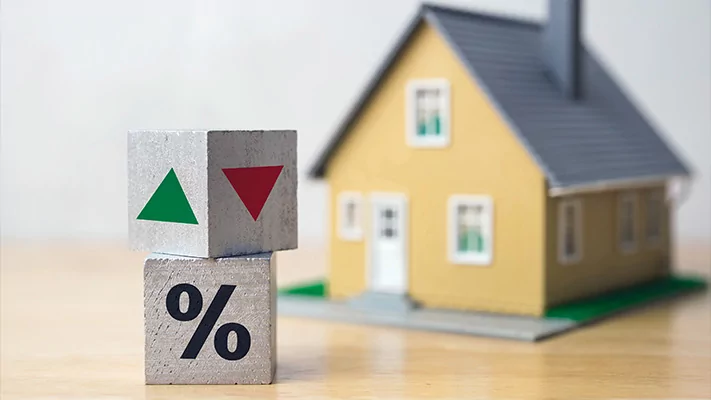

Despite broader concerns about the economy, consumers are starting to see mortgage rates move lower, a trend experts expect to continue this year as the Federal Reserve begins to loosen monetary policy.
The housing market has been upended by the Fed driving interest rates up to their highest level since the dot-com bubble at the turn of the century. That has made the cost of taking out a mortgage and paying for a home much worse. The economic pain has been compounded by housing prices skyrocketing during the COVID-19 pandemic due to explosive demand, so any decline in mortgage rates is welcome news.
Jessica Lautz, the National Association of Realtors’s deputy chief economist and vice president of research, told the Washington Examiner that the declining mortgage rates are welcome news for consumers and potential homebuyers.
“Our forecast does have mortgage rates continuing to fall, especially with the Fed’s expectation — and I would say likely stronger expectation after the jobs data last week — that the Fed will reduce rates in September, and so as we look to the fall, we could see further reductions,” she said.
Fed policy is one of the major factors affecting where mortgage rates go. And perceptions of Fed policy and where it might go changed quickly last week when the latest jobs report was published.
The economy added 114,000 jobs in July, and the unemployment rate rose to 4.3%, the Bureau of Labor Statistics reported Friday. Investors had expected roughly 176,000 new jobs and for the unemployment rate to hold steady at 4.1%, so the report was a bit of a surprise to economists and caused some alarm bells to start ringing.
Immediately, all eyes turned to the Fed. Investors now think the Fed will cut interest rates by more than anticipated, and if there are more signs the labor market is starting to deteriorate, it could force the Fed’s hand to cut more. Mortgage rates tend to move up or down with interest rate revisions, so the recent news has helped mortgage rates move lower.
As of this week, mortgage rates have now fallen to 6.55%, the lowest level in 15 months.
Mortgage rates peaked at over 8% late last year. They began to fall after that when it appeared likely the Fed would cut interest rates but then popped back up because hotter-than-expected inflation reports in the first half of 2024 caused the Fed to push back the timing of its monetary policy pivot.
Mortgage rates hit their highest point of 2024 in April when they clocked in at 7.44% but have largely fallen since then. The recent decline after the disappointing July employment data were released marks about a 0.9% decline from this year’s peak.
There has been a noticeably sharp decline since the release of the jobs report.
“Long-term bond deals have retraced some of that, but nonetheless, mortgage rates do seem poised to trend lower,” Greg McBride, chief financial analyst at Bankrate, told the Washington Examiner.
Still, McBride pointed out it is a misnomer to assume mortgage rates will move completely in tandem with the Fed’s rate revisions over the coming months.
“Certainly, the moderating pace of the economy and continued easing of inflation pressures is good for mortgage rates, but mortgage rates are not going to fall as much as the Fed cuts short-term rates,” he said. “I think it would be a mistake to presume that the Fed would cut rates three times, and so that automatically means mortgage rates would come down by a like amount.”
Lautz emphasized that even now though, consumers are feeling some relief given that less than a year ago, the housing market was plagued by towering mortgage rates of around 8% — the highest they had been in nearly a quarter of a century. She pointed out that more inventory has been coming into the real estate, good news for homebuyers, as more supply can dampen price pressures in the market.
“While we do expect that home prices will continue to rise, it’s just not likely going to be at that extreme end that it had been,” she said.
Lautz said it will take some time for the housing market to heat up but noted the good news from the Mortgage Bankers Association this week that the market composite index, a measure of mortgage loan application volume, rose 6.9% on a seasonally adjusted basis from the previous week. That shows homebuying activity is starting to trend up while mortgage rates trend down.
“So hopefully we will see stronger activity in the home buying market moving forward,” she said. “But it does take a little bit of time before that happens; it’s not an overnight switch.”
But how fast will rates fall?
The best thing for the housing market would be a gradual decline in mortgage rates rather than an abrupt decline, according to McBride. That is because if mortgage rates quickly went into a free fall, it could produce a surge in demand that would send home prices soaring and make it more challenging for people to afford a home. That increase might offset some or all of the affordability benefits from lower mortgage rates.
“By contrast, a more gradual decline in mortgage rates is conducive to an environment where the scales tip in favor of the homebuyer,” he said.
What about further down the line?
CLICK HERE TO READ MORE FROM THE WASHINGTON EXAMINER
McBride said that while it is quite early to predict how mortgage rates will shake out in 2025 if expectations hold, rates should continue to moderate in the coming months and year.
“I think in an environment where the Federal Reserve is in a campaign of reducing short-term interest rates back to a more neutral level that we can hope that mortgage rates will trend lower not only for the balance of 2024 but well into 2025 as well,” McBride said.






